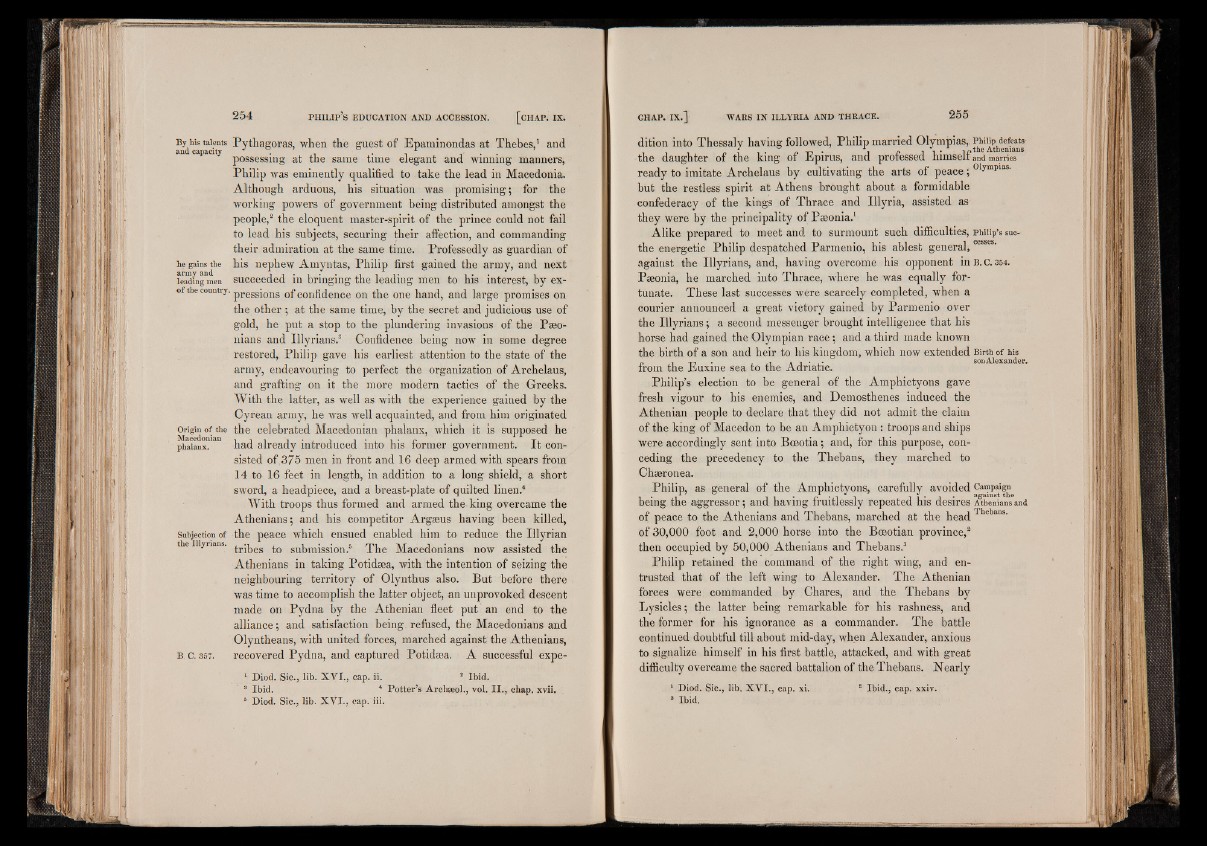
By his talents
and capacity
he gains the
army and
leading men
of the country.
Origin of the
Macedonian
phalanx.
Subjection of
the Illyrians.
B. C. 357.
Pythagoras, when the guest of Epaminondas at Thebes,1 and
possessing at the same time elegant and winning manners,
Philip was eminently qualified to take the lead in Macedonia.
Although arduous, his situation was promising; for the
working powers of government being distributed amongst the
people,8 the eloquent master-spirit of the prince could not fail
to lead his subjects, securing their affection, and commanding
their admiration at the same time. Professedly as guardian of
his nephew Amyntas, Philip first gained the army, and next
succeeded in bringing the leading men to his interest, by expressions
of confidence on the one hand, and large promises on
the other ; at the same time, by the secret and judicious use of
gold, he put a stop to the plundering invasions of the Paeo-
nians and Illyrians.8 Confidence being now in some degree
restored, Philip gave his earliest attention to the state of the
army, endeavouring to perfect the organization of Archelaus,
and grafting on it the more modern tactics of the Greeks.
With the latter, as well as with the experience gained by the
Cyrean army, he was well acquainted, and from him originated
the celebrated Macedonian phalanx, which it is supposed he
had already introduced into his former government. It consisted
of 375 men in front and 16 deep armed with spears from
14 to 16 feet in length, in addition to a long shield, a short
sword, a headpiece, and a breast-plate of quilted linen.4
With troops thus formed and armed the-king overcame the
Athenians; and his competitor Argaeus having been killed,
the peace which ensued enabled him to reduce the Illyrian
tribes to submission.5 The Macedonians now assisted the
Athenians in taking Potidaea, with the intention of seizing the
neighbouring territory of Olynthus also. But before there
was time to accomplish the latter object, an unprovoked descent
made on Pydna by the Athenian fleet put an end to the
alliance; and satisfaction being refused, the Macedonians and
Olyntheans, with united forces, marched against the Athenians,
recovered Pydna, and captured Potidaea. A successful expe-
1 Diod. Sic., lib. X V I., cap. ii. 8 Ibid.
3 Ibid. 4 Po tter’s Archseol., vol. I I ., chap. xvii.
5 Diod. Sic., lib. X V I., cap. iii.
dition into Thessaly having followed, Philip married Olympias, Phibp^defeats-
the daughter of the king of Epirus, and professed himself and marries
ready to imitate Archelaus by cultivating the arts of peace; ympias'
but the restless spirit at Athens brought about a formidable
confederacy of the kings of Thrace and Illyria, assisted as
they were by the principality of Pamnia.1
Alike prepared to meet and to surmount such difficulties, Philip’s suc-
the energetic Philip despatched Parmenio, his ablest general,cesses-
against the Illyrians, and, having overcome his opponent in B.C. 354.
Paeonia, he marched into Thrace, where he was equally fortunate.
These last successes were scarcely completed, when a
courier announced a great victory gained by Parmenio over
the Illyrians; a second messenger brought intelligence that his
horse had gained the Olympian race; and a third made known
the birth of a son and heir to his kingdom, which now extended Birth of his
from the Euxine sea to the Adriatic. sonAiexander.
Philip’s election to be general of the Amphictyons gave
fresh vigour to his enemies, and Demosthenes induced the
Athenian people to declare that they did not admit the claim
of the king of Macedon to be an Amphictyon: troops and ships
were accordingly sent into Bceotia; and, for this purpose, conceding
the precedency to the Thebans, they marched to
Chaeronea.
Philip, as general of the Amphictyons, carefully avoided Campaign
being the aggressor; and having fruitlessly repeated his desires Athenians and
of peace to the Athenians and Thebans, marched at the head Tbebans-
of 30,000 foot and 2,000 horse into the Boeotian province,8
then occupied by 50,000 Athenians and Thebans.3
Philip retained the command of the right wing, and entrusted
that of the left wing to Alexander. The Athenian
forces were commanded by Chares, and the Thebans by
Lysicles; the latter being remarkable for his rashness, and
the former for his ignorance as a commander. The battle
continued doubtful till about mid-day, when Alexander, anxious
to signalize himself in his first battle, attacked, and with great
difficulty overcame the sacred battalion of the Thebans. Nearly
1 Diod. Sic., lib. X V I., cap. xi. 8 Ibid., cap. xxiv.
3 Ibid.